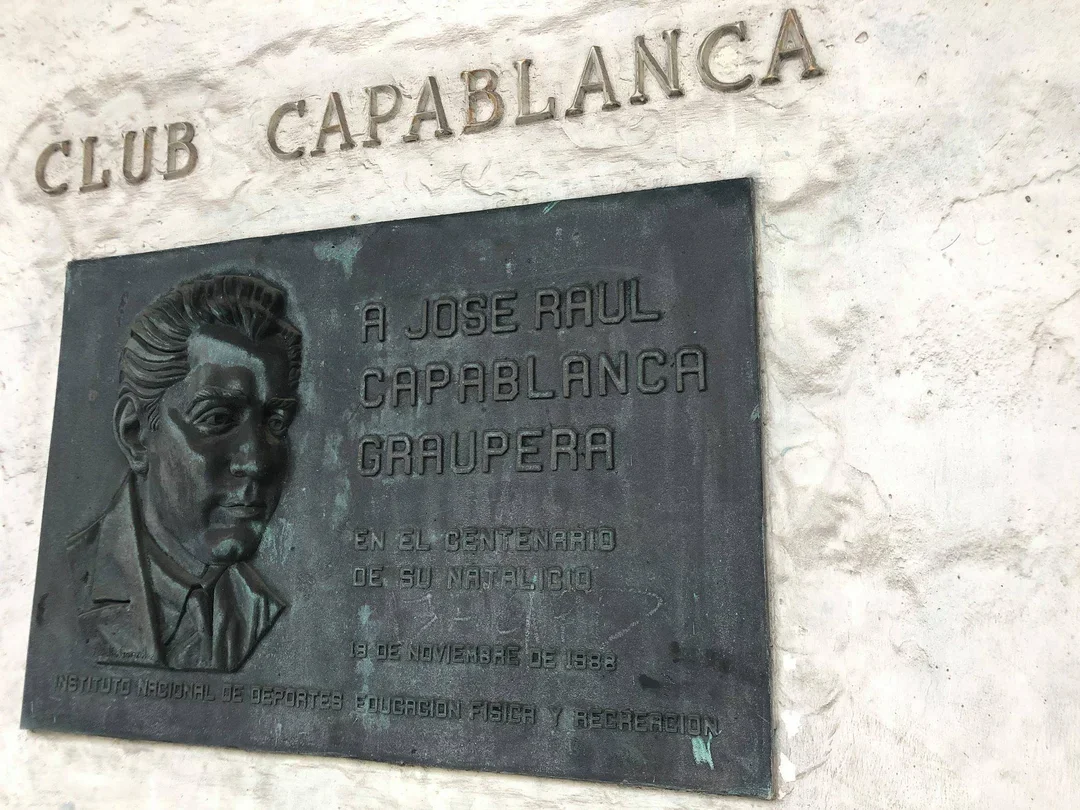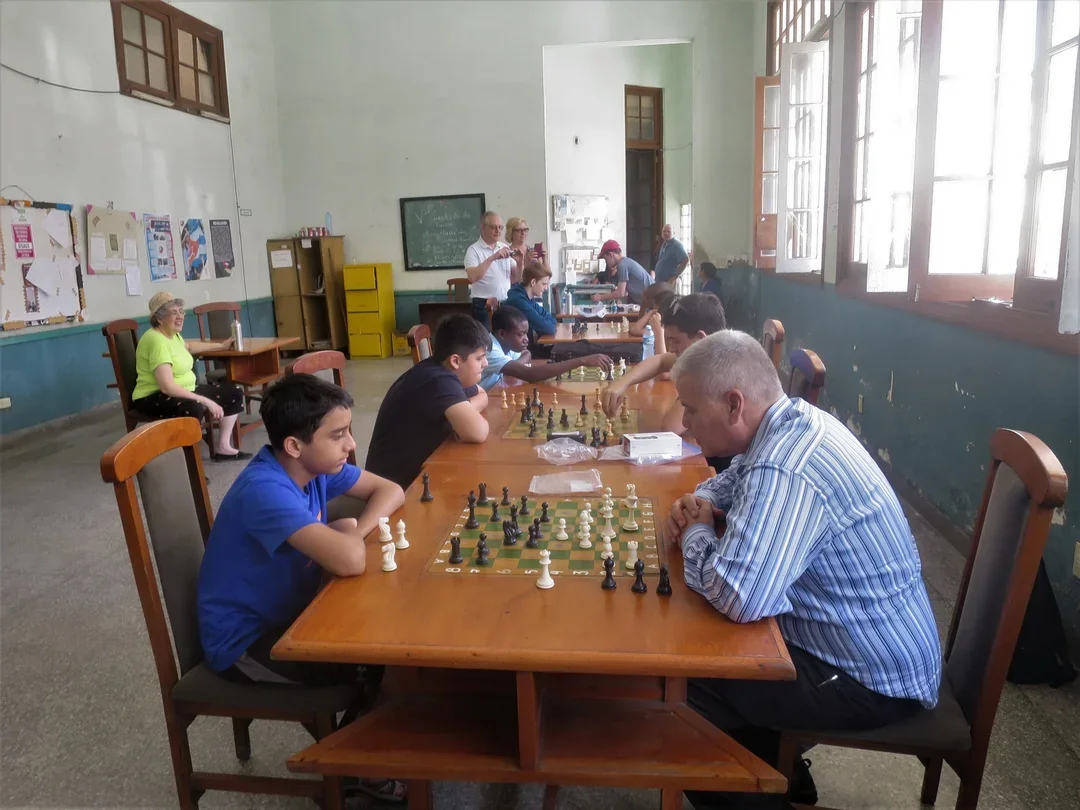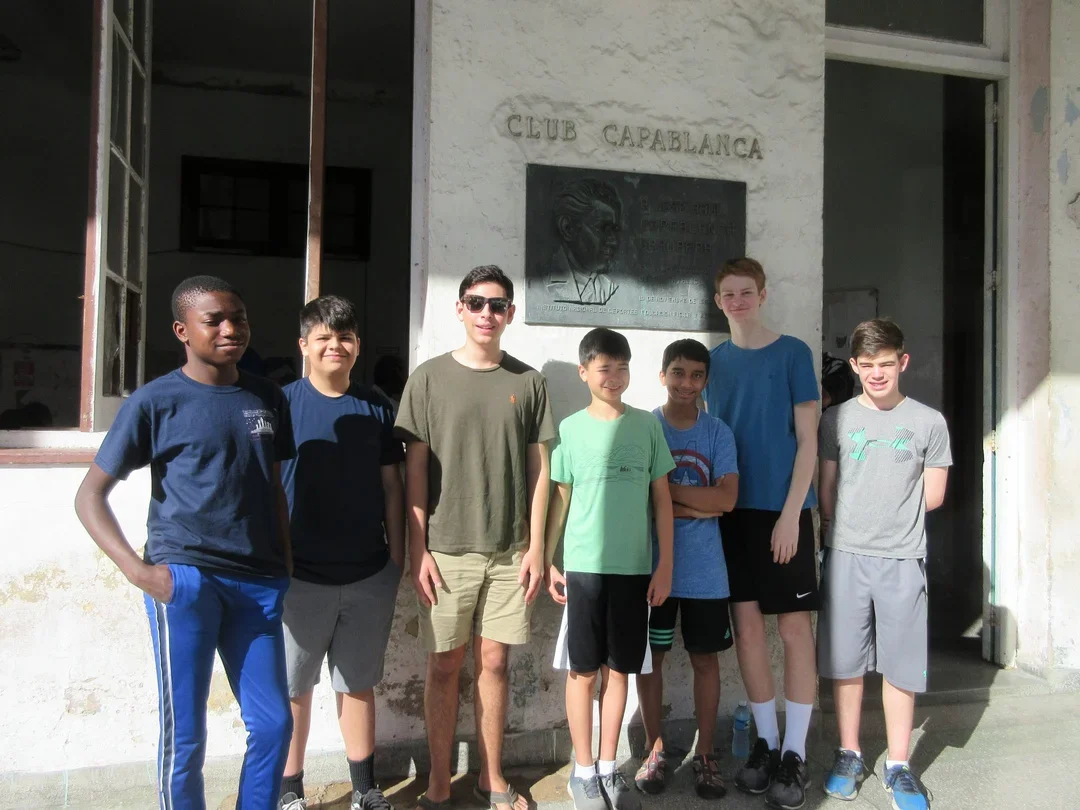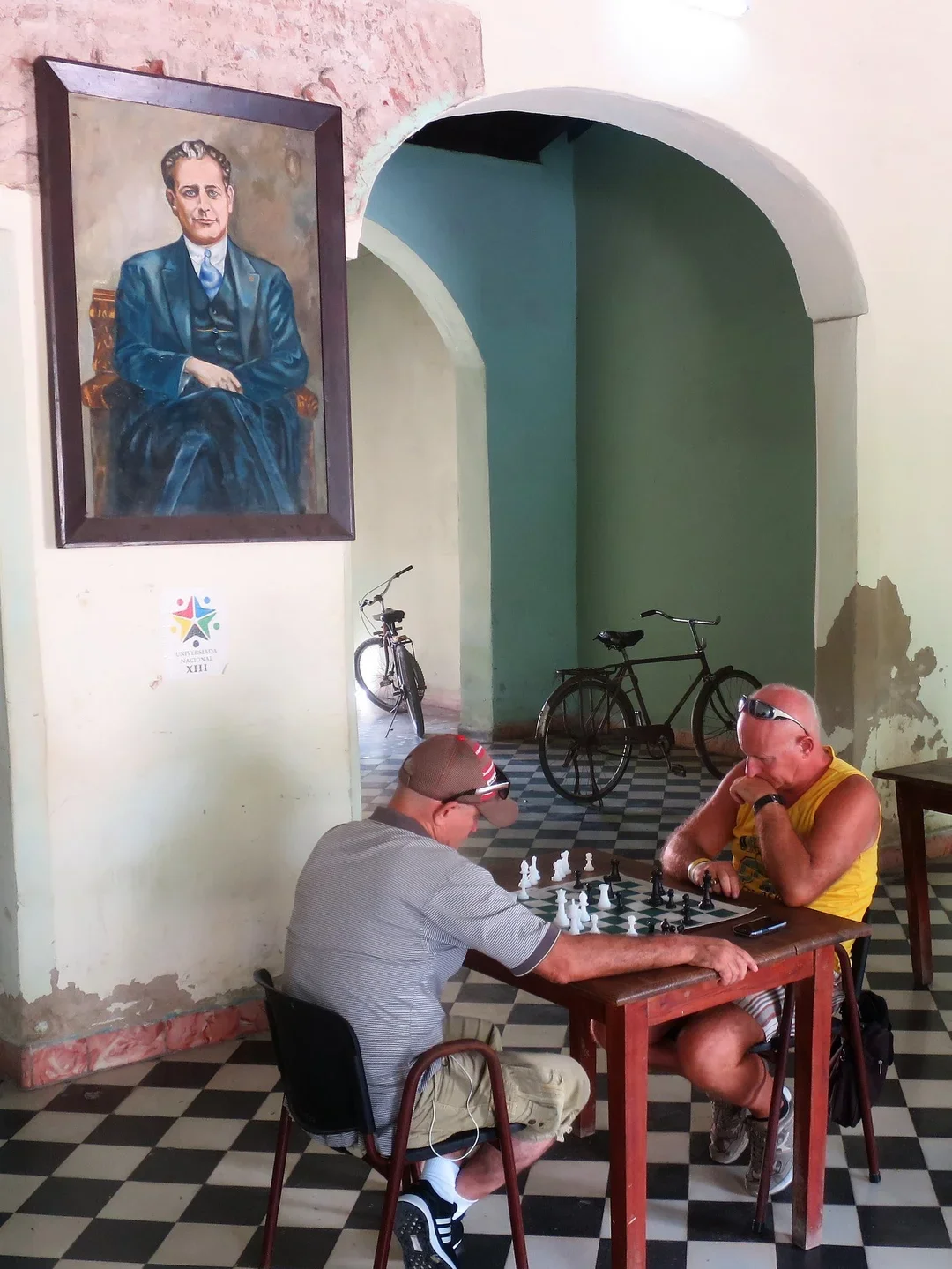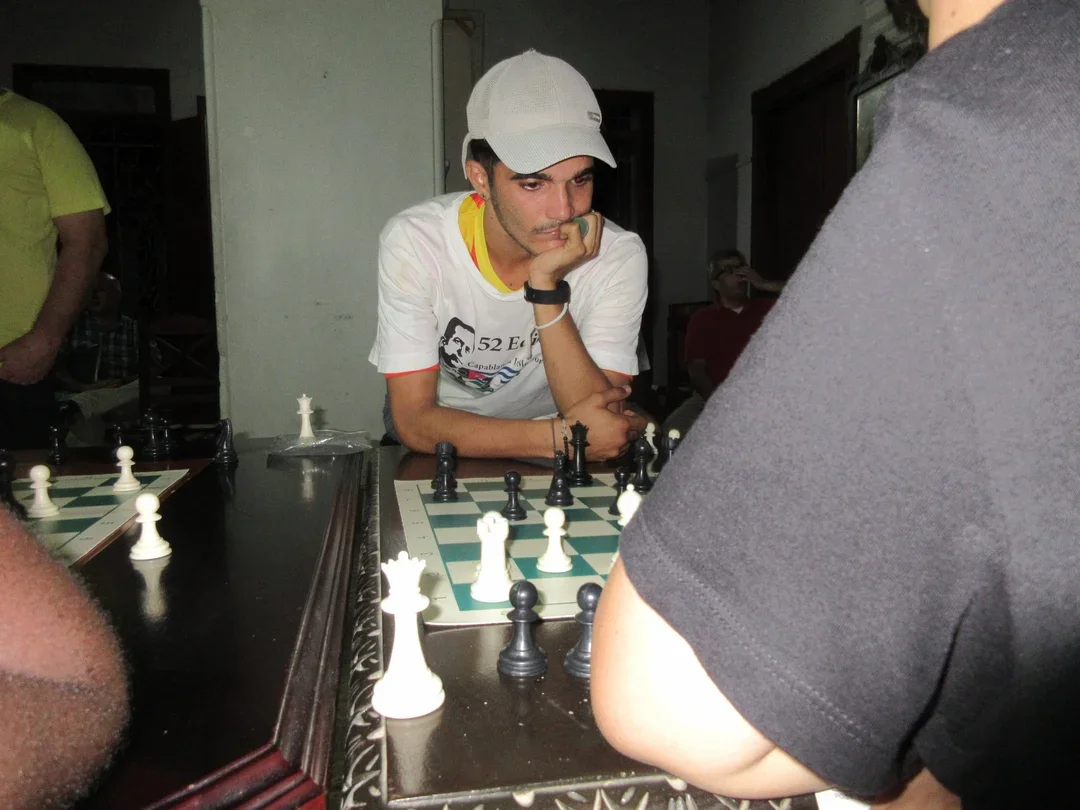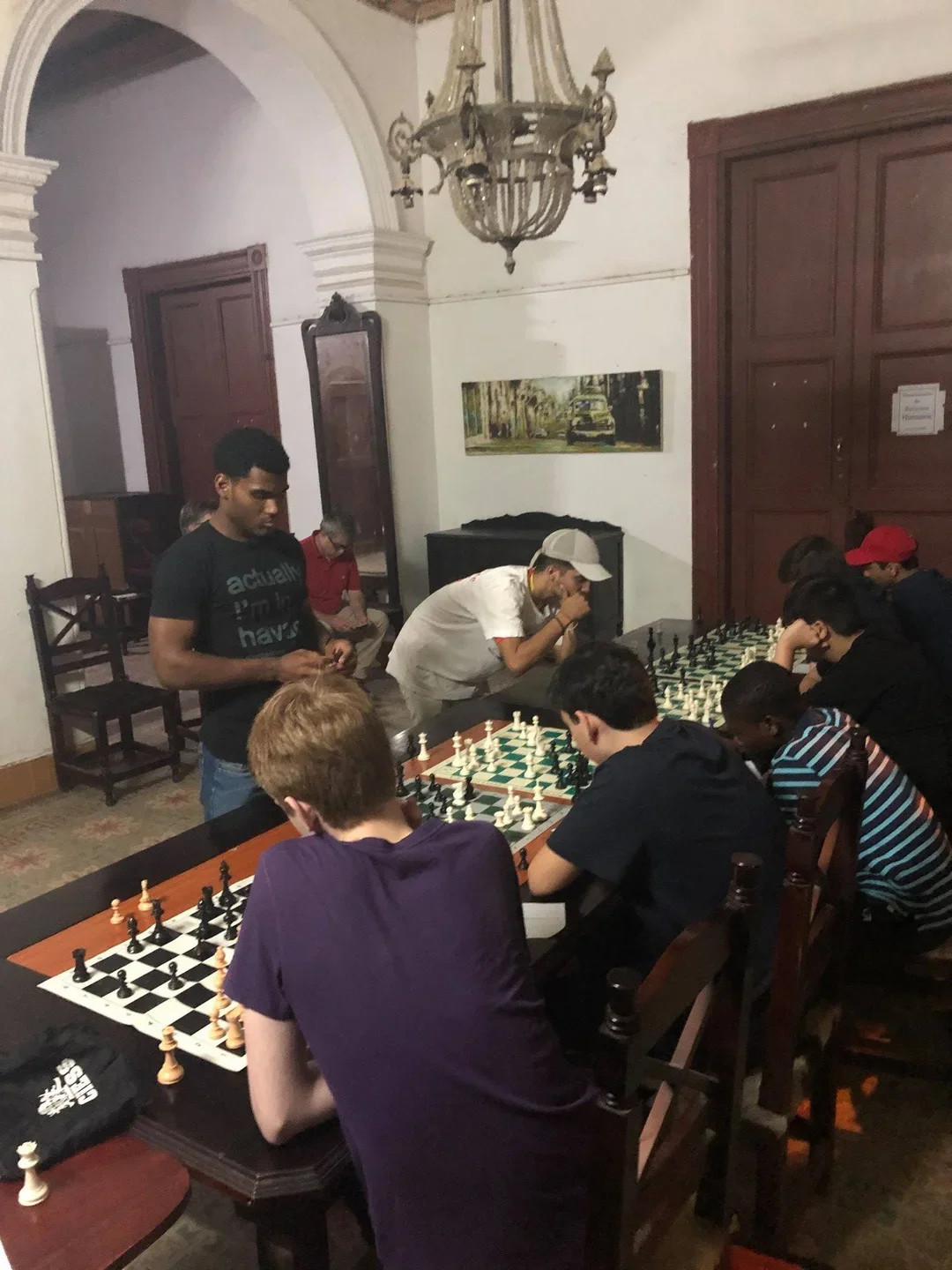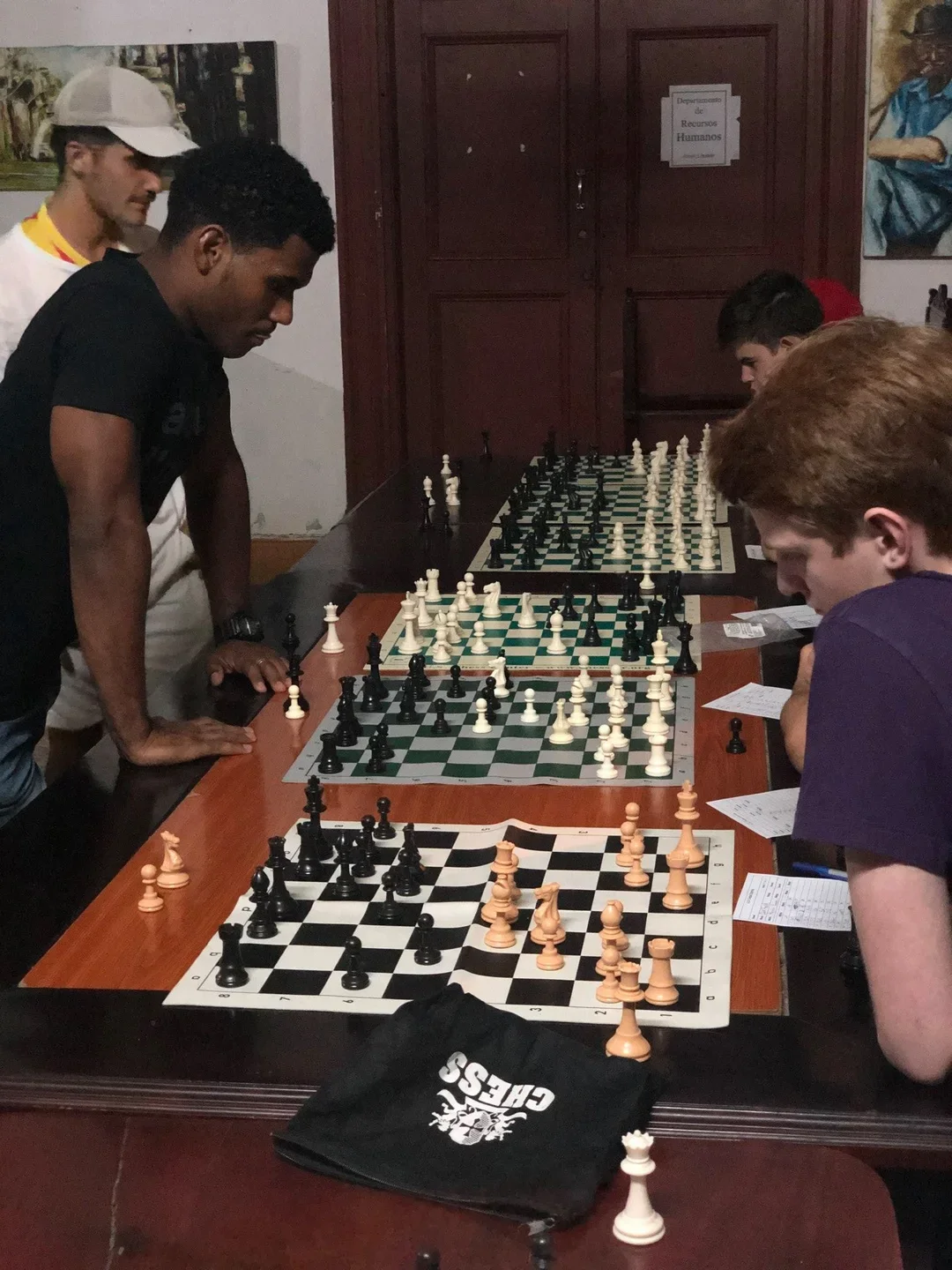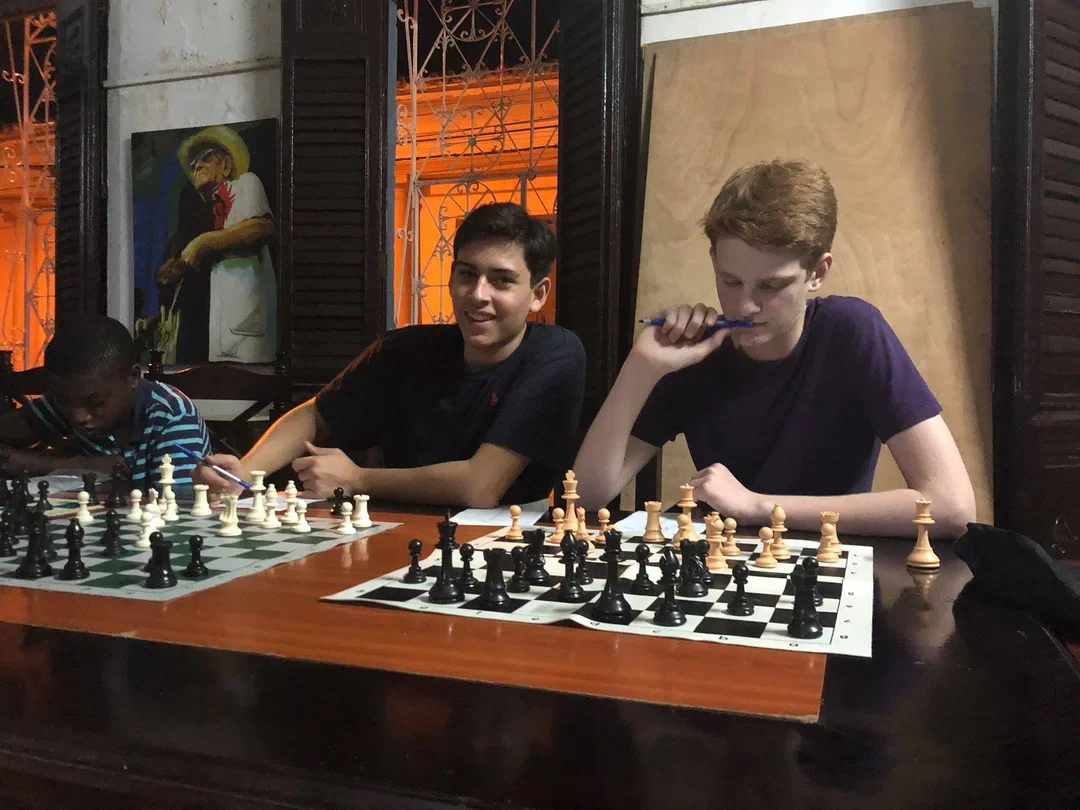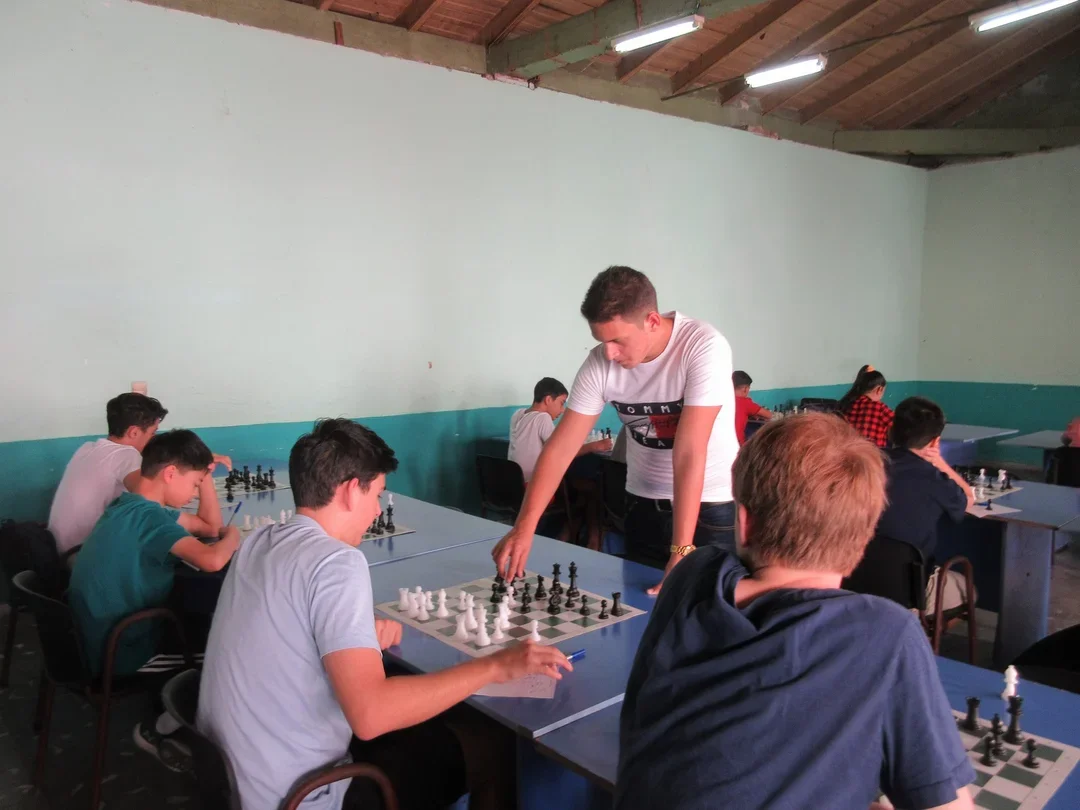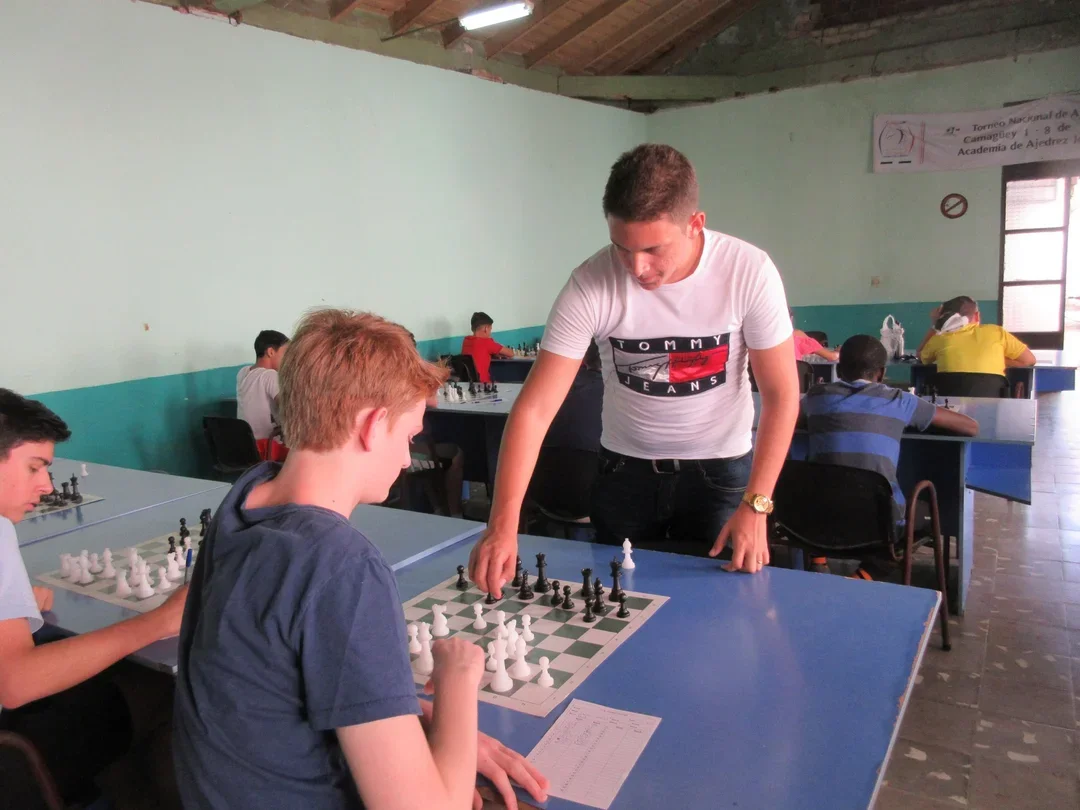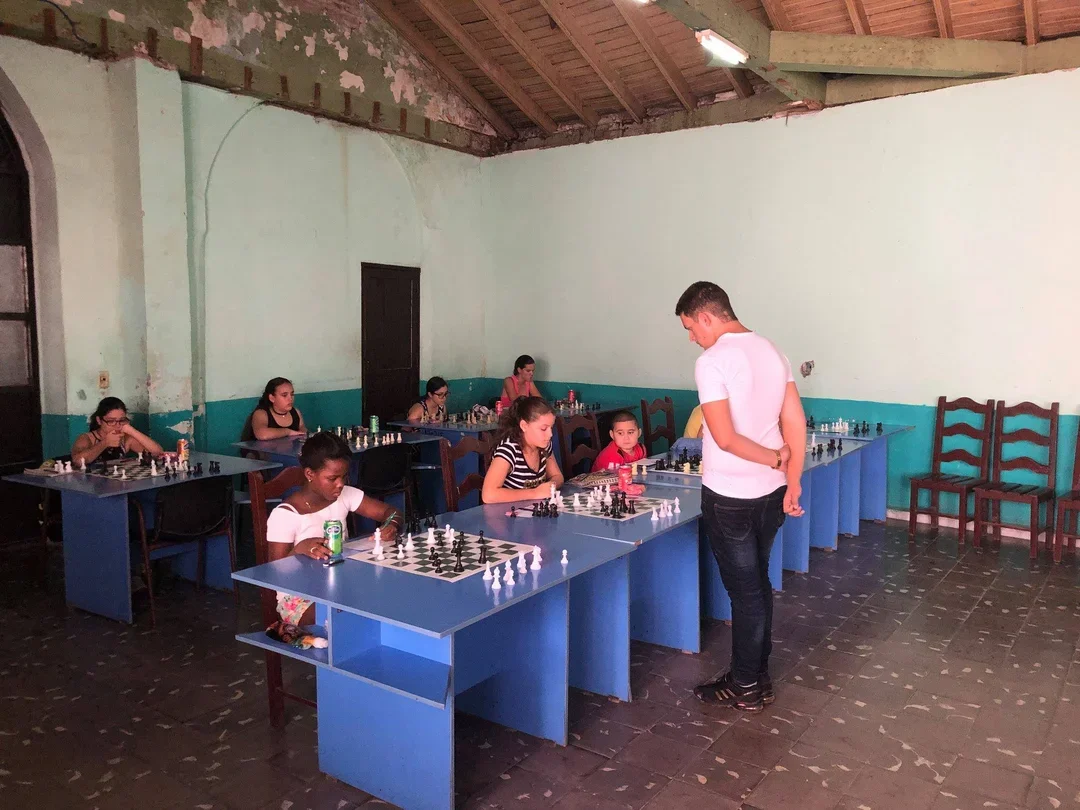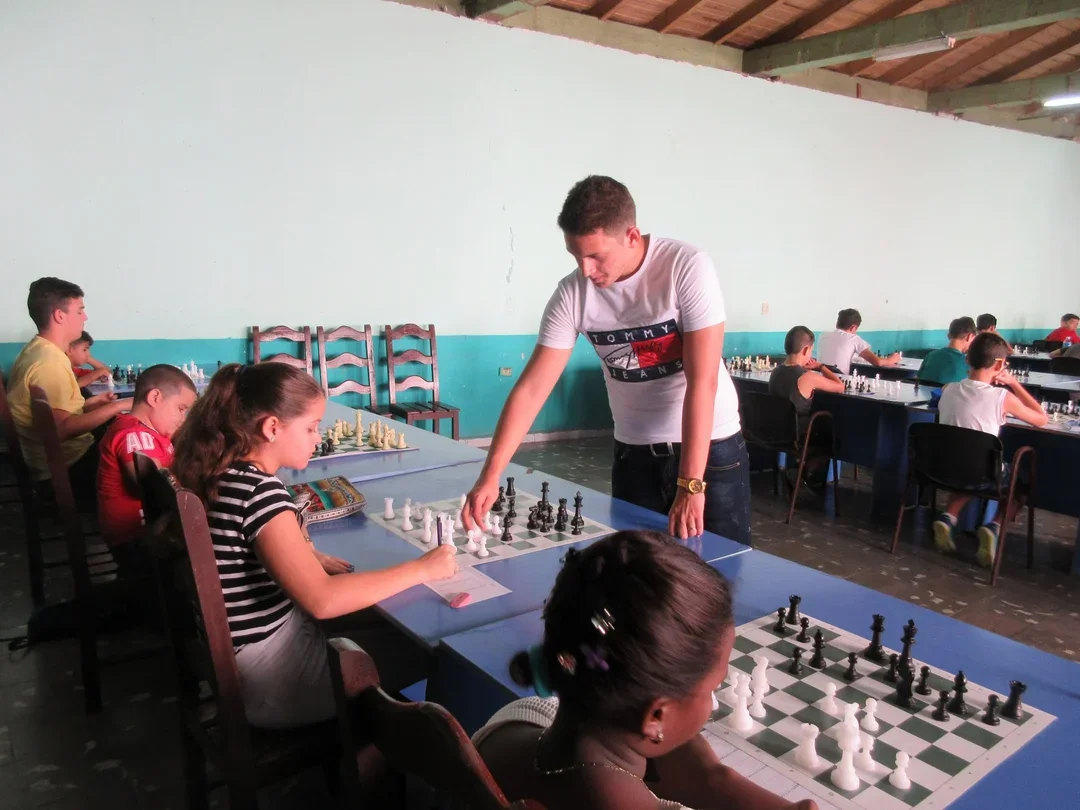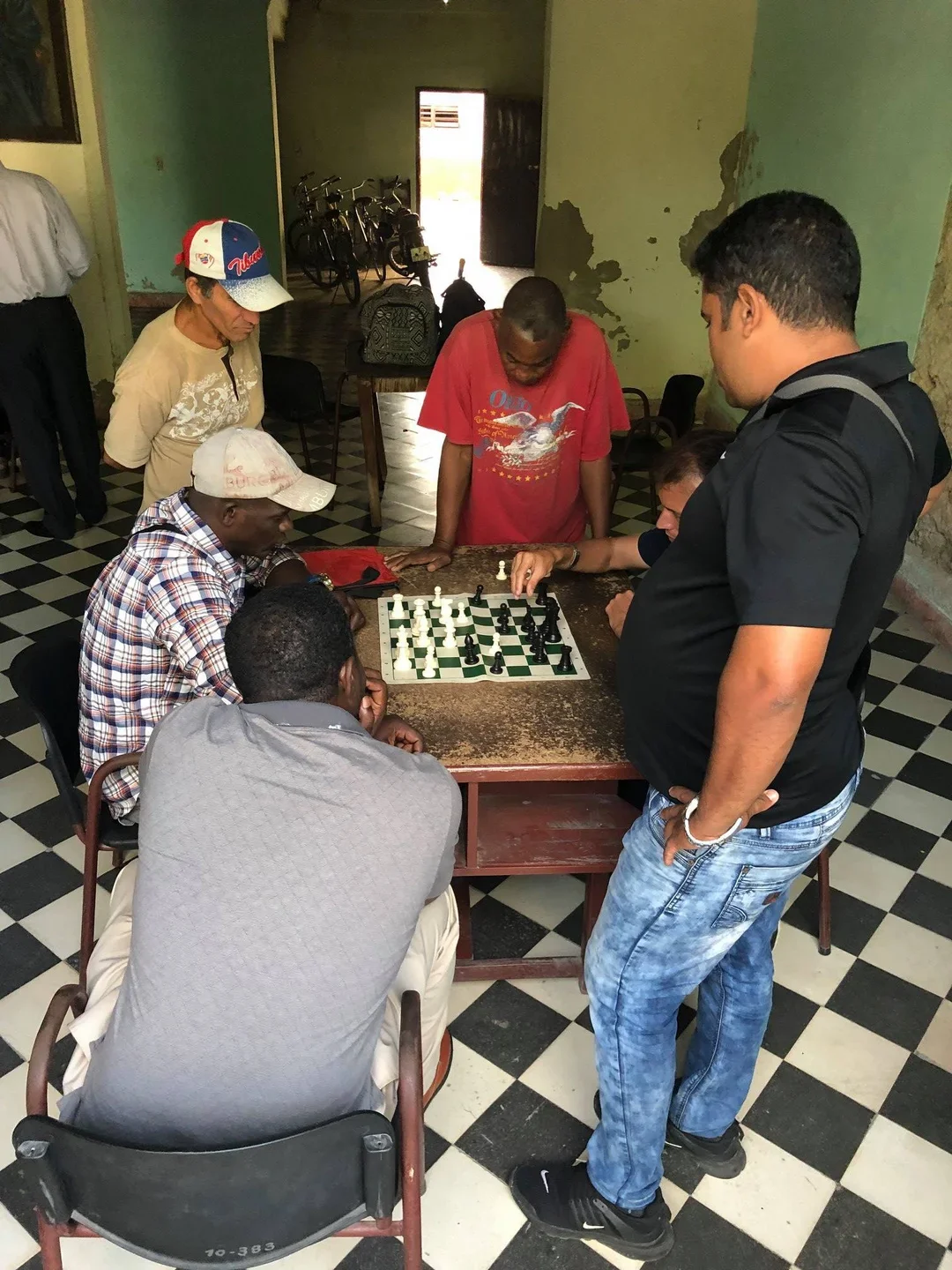Chess has been a tool of diplomacy for centuries. The first American Secretary of State, Thomas Jefferson, was an avid player, as were many of his successors. Benjamin Franklin authored and published a text on the value of the game and founded the club in Philadelphia that bears his name. Over winter break, we showed that young chess players also can promote international understanding and cultural awareness in places that do not see many people from other countries.
Seven American teenage ambassadors of chess traveled to Cuba over winter break to share their passion for the game with their Caribbean counterparts. The trip was organized by the U.S. Chess Center of Silver Spring, Maryland.
Cuba is well known for supporting chess. While salsa music and baseball might be more popular on the island, chess has been a mainstay of Cuban life for generations. José Capablanca is revered as a national hero; his tomb is marked by an oversized chess piece in the Colón Cemetery. Fidel Castro and Che Guevara were chess players and commissioned chess clubs in most Cuban cities.
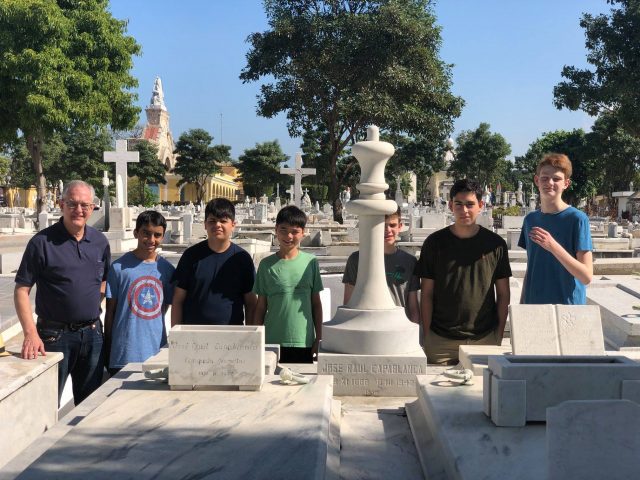 Capablanca's Grave
The seven Americans represented a substantial swath of America. Anish Singh and David French came from Virginia. Zachary Stier Pan is from Washington, DC, and Bram Halpert lives in Maryland. Torin Kuehnle is part of the Masterman High School team in Pennsylvania, while Benjamin Bankhead of California and Jonathan Martinez of the Catalina Foothills High School team of Arizona are friends who have played together in international competitions.
US Chess Sales generously discounted their prices so that we could donate demonstration boards and modern clocks to the clubs we visited.
Our visit began in Havana, the capital city. Our ambassadors played with students at the historic Capablanca Chess Club. Both the Americans and Cubans possessed a wide range of experience. Some of the Americans offered lessons to young Cubans, while other Cubans offered more than enough challenge for the Americans.
Havana Chess Commissioner FM Osvaldo Lopez Gari arranged for several strong Cuban adults to give lessons to the visitors, and FM Eduardo Jesus Mendez Fortes performed a simultaneous exhibition for us. He scored 6½ - ½, giving up a draw to Anish Singh.
FM Fortes, playing Black, had several ways to win this game. Distracted by games where the outcomes seemed more in doubt, he blundered with 1. … a5, leaving Anish to continue with 2.c7 Rc8 3.Rc6! After 3. … Rxc7 4.Rxd6 the game petered out to a draw.
Our students complemented their chess experiences by enjoying the fresh food and culture of Havana. Live music was heard on nearly every block of the Old City. Each evening we saw a full orchestra in Plaza San Francisco that played a combination of Cuban music and classical works.
The students and adults on the trip walked throughout the city and visited the newly restored Capitol Building. Adults enjoyed rides in 1950s American cars and saw three floors of Cuban art and performance in an old warehouse at Fabrica de Arte Cubano.
From Havana, we continued to the city of Trinidad on the southern coast, going through Cienfuegos, with its market and architecture reminiscent of the French Quarter of New Orleans. In Trinidad we met our host FM Ernesto Piedra Salabarria and his friend FM Alejandro Pomares Diaz.
They each took on half of our group in an impromptu simultaneous exhibition, and Jonathan Martinez surprised Ernesto with this performance.
Capablanca's Grave
The seven Americans represented a substantial swath of America. Anish Singh and David French came from Virginia. Zachary Stier Pan is from Washington, DC, and Bram Halpert lives in Maryland. Torin Kuehnle is part of the Masterman High School team in Pennsylvania, while Benjamin Bankhead of California and Jonathan Martinez of the Catalina Foothills High School team of Arizona are friends who have played together in international competitions.
US Chess Sales generously discounted their prices so that we could donate demonstration boards and modern clocks to the clubs we visited.
Our visit began in Havana, the capital city. Our ambassadors played with students at the historic Capablanca Chess Club. Both the Americans and Cubans possessed a wide range of experience. Some of the Americans offered lessons to young Cubans, while other Cubans offered more than enough challenge for the Americans.
Havana Chess Commissioner FM Osvaldo Lopez Gari arranged for several strong Cuban adults to give lessons to the visitors, and FM Eduardo Jesus Mendez Fortes performed a simultaneous exhibition for us. He scored 6½ - ½, giving up a draw to Anish Singh.
FM Fortes, playing Black, had several ways to win this game. Distracted by games where the outcomes seemed more in doubt, he blundered with 1. … a5, leaving Anish to continue with 2.c7 Rc8 3.Rc6! After 3. … Rxc7 4.Rxd6 the game petered out to a draw.
Our students complemented their chess experiences by enjoying the fresh food and culture of Havana. Live music was heard on nearly every block of the Old City. Each evening we saw a full orchestra in Plaza San Francisco that played a combination of Cuban music and classical works.
The students and adults on the trip walked throughout the city and visited the newly restored Capitol Building. Adults enjoyed rides in 1950s American cars and saw three floors of Cuban art and performance in an old warehouse at Fabrica de Arte Cubano.
From Havana, we continued to the city of Trinidad on the southern coast, going through Cienfuegos, with its market and architecture reminiscent of the French Quarter of New Orleans. In Trinidad we met our host FM Ernesto Piedra Salabarria and his friend FM Alejandro Pomares Diaz.
They each took on half of our group in an impromptu simultaneous exhibition, and Jonathan Martinez surprised Ernesto with this performance.
 Capablanca's Grave
Capablanca's Grave[pgn]
[Event "Trinidad Simul"]
[Site "?"]
[Date "2019.??.??"]
[Round "?"]
[White "Martinez, Jonathan"]
[Black "Salabarria, Ernesto Piedra"]
[Result "1-0"]
[ECO "C50"]
[WhiteElo "1900"]
[BlackElo "2306"]
[Annotator "Martinez, Jonathan"]
[PlyCount "91"]
[SourceVersionDate "2019.02.19"]
1. e4 {I expected a Sicilian because I faced many of those previously in
Havana. However, I got an Italian.} e5 2. Nf3 Nc6 3. Bc4 Be7 4. O-O d6 5. d3
Bg4 {This move is unusual in that the pin is not that effective; White's
typical knight maneuver exploits this.} 6. c3 Nf6 7. Nbd2 O-O 8. h3 (8. Bb3 {
is a typical move to prevent ... Na5 because I could retreat my bishop to c2})
8... Bh5 9. Re1 Na5 10. Bb5 c6 11. Ba4 b5 12. Bc2 c5 13. Nf1 Nc6 14. Ng3 Bg6
15. d4 {This is a bad move because it rewards Black for moving his bishop to
g6 and suddenly e4 is a target. I think 15.Nh4 was a better move than 15.d4
because my knight can be nicely planted on f5.} cxd4 16. cxd4 d5 {This move is
an error. Even though it's a thematic advance, it's the wrong time to play it.}
17. dxe5 (17. Nxe5 Nxe5 18. dxe5 Nxe4 19. Nxe4 dxe4 20. Bf4 {would have been a
better way for me to play this variation because the e4 pawn is really weak
and will fall eventually.}) 17... Nxe4 18. Bf4 Bb4 19. Re2 Nxg3 20. Bxg3 Bh5
21. Qd3 {The double attack on the b5 and h7 pawns strengthens my advantage and
Ernesto thought for a while on his next move.} g6 22. a3 {I intended for this
move to attack the bishop so that I could play Rd2 to attack the weak d5 pawn.
a3 ended up being a mistake because it allows Ernesto to give me doubled pawns
on f2 and f3 and attain an advantage} ({I should have played} 22. Bh4 Qd7 23.
g4 {winning a piece on the spot, with minimal compensation for Ernesto.}) 22...
Bxf3 23. gxf3 Bc5 24. Rd2 Nd4 (24... Nxe5 {would have been better for Ernesto
because it wins a useful pawn and opens my king. I had not seen this during
the game} 25. Bxe5 Qg5+ 26. Bg3 Qxg3+) 25. Bd1 Nf5 26. Kh2 h5 27. Qxb5 Bd4 28.
Rb1 Rb8 29. Qe2 h4 30. Bf4 Bc3 31. Rd3 d4 32. b4 {I played this move to
completely trap the dark-squared bishop, rendering it useless.} ({I missed} 32.
e6 {that would have given me a surprisingly huge advantage [after]} Rb7 33. Bc2
Ba5 34. exf7+ Rfxf7 35. Bb3) 32... Ng7 33. Bb3 {At this time, a 10 minute
clock was set because it was getting dark and I became nervous because I don't
perform well under time pressure.} Qc7 34. Rg1 Ne6 {I missed a simple tactic
that would have ended the game.} 35. Bd2 {When Ernesto and I reviewed this
later, we concluded that 35.Bd2 was not the best move because it allows
Ernesto to trade his bad bishop for my good bishop that can exploit all of the
weak dark squares on the kingside.} (35. Bxe6 fxe6 36. Rxg6+ Kh7 37. Rh6+ Kg8
38. Qe4 {is better.}) 35... Rfc8 36. Ba2 {This move was prophylactic,
preparing against any future ... Nc5 or ... a5 attacks.} a5 37. f4 axb4 38.
axb4 (38. f5 b3 {blocks the pin on the f7-pawn.} 39. Bb1 Nf8) 38... Nf8 39. f5
Bxd2 40. Rxd2 Rb6 41. Rxd4 {I felt confident in my ability to win at this
point, but I kept my focus because I remember countless stories of people
letting their guard down and losing in winning positions.} Rc6 42. Bb3 Rc3 {
My time was running down at this point in the game and I could not completely
calculate the following forcing line of 43.fxg6 Rxb3 44.gxf7+. I decided to go
for it because I sensed that his king was too weak for 43.fxg6 to be bad.} 43.
fxg6 Rxb3 44. gxf7+ Kh8 (44... Kxf7 {doesn't lose immediately, but I planned
on skewering the king to the queen and I was satisfied with the position} 45.
Qh5+ Ke7 46. Rg7+ Ke6 47. Rxc7 Rxc7 48. Qh6+ Kxe5 49. Qd6+ Kf5 50. Rf4+ Kg5 51.
Qf6+ Kh5 52. Rxh4#) 45. Rg8+ Kh7 46. Qh5# {I was so excited to play this move,
and it was definitely my favorite moment of the trip.} 1-0
[/pgn]
The next evening, after an afternoon on the beach, we met and played chess with a group of local players. It was a casual evening of quick games, with the two groups getting to know each other while playing together.
Then it was off to Camagüey, in the center of the country. FM Antonio Pereira Mantecon arranged for several groups of players to join with ours for friendly competition. Their first group consisted of young players, all under age 13. The next group were students of similar age to the Americans, and finally they had us play with stronger students including the up-and-coming 14-year-old, Hernández Gil. Playing matches with 21 of their youngsters was a great treat.
The Camagüey club is impressive in many ways. They run after-school classes for 56 children, ranging from 5 through 16 years old, throughout the academic year. The students, more than a third of whom are female, are selected for the class based on intellectual performance. Each student is expected to attend class every day after school for three hours, plus attend competitions on the weekends. Six instructors work with the kids, including four who have FIDE titles.
Several superstars of Cuban chess have emerged from this program, including GM-elect Carlos Daniel Albornoz.
Albornoz performed a 25-board simultaneous exhibition that included our seven ambassadors, as well as a few of Camagüey’s emerging stars. He gave up two draws, including one to our Zachary Stier Pan.
[pgn]
[Event "Camagüey simul"]
[Site "?"]
[Date "2019.??.??"]
[Round "?"]
[White "Stier Pan, Zachary"]
[Black "Albornoz, Carlos Daniel"]
[Result "1/2-1/2"]
[ECO "B50"]
[Annotator "Stier Pan, Zachary"]
[PlyCount "63"]
[SourceVersionDate "2019.02.19"]
1. e4 c5 2. Nf3 d6 3. Bc4 Nf6 4. Nc3 a6 5. d3 b5 6. Bb3 e6 7. a4 {Better was
castling as a4 doesn't accomplish much and does not help my development.} b4 8.
Ne2 Be7 9. Ng3 O-O 10. d4 {10.0-0 was better as to not open the center when
the king is not yet castled.} cxd4 11. Nxd4 Bb7 12. Qd3 {12.f3 is better; the
queen looks awkward after ... Nfd7 and ... Nc6.} Nbd7 13. f3 Nc5 14. Qe3 {
Qe2 was better so as not to block the bishop.} Rc8 15. Ba2 d5 16. e5 Nfd7 17.
O-O g6 18. Bd2 Nxa4 19. Bxd5 Bxd5 20. Rxa4 Nb6 21. Raa1 Nc4 22. Qh6 Nxd2 {
Black should have taken on e5; it would have given him a commanding lead.} 23.
Qxd2 Bc5 24. Kh1 Bc4 {This is a wasted move as it wins no material and allows
my knight to go to e4.} 25. Rfd1 Bd5 26. Rxa6 {This won me a pawn against a
GM! But 26.Qh6 was more accurate.} Bxd4 27. Qxd4 Rxc2 28. Ne4 Kg7 29. Nf6 Rc4
30. Qd2 h6 31. Rd6 Qc8 32. Nd7 1/2-1/2
[/pgn]
We all went to lunch after the competition, and then back to the guesthouse where the Americans were staying. GM Albornoz and his friend Laritza Alfonso Ruisanchez socialized with the group, playing blitz and telling us about their lives.
The Cuban people are, like their climate, warm and accommodating. We hope this trip serves to foster a continuing relationship with Cuban players. We also hope to see them again in their country and to host them in ours.
David Mehler is a nationally certified Professional Chess Coach and has been President of the U.S. Chess Center since 1991. All photos in this article are courtesy of David Mehler and the U.S. Chess Center Facebook page.Categories
Archives
- December 2025 (25)
- November 2025 (29)
- October 2025 (39)
- September 2025 (27)
- August 2025 (29)
- July 2025 (43)
- June 2025 (25)
- May 2025 (24)
- April 2025 (29)
- March 2025 (29)
- February 2025 (20)
- January 2025 (24)
- December 2024 (34)
- November 2024 (18)
- October 2024 (35)
- September 2024 (23)
- August 2024 (27)
- July 2024 (44)
- June 2024 (27)
- May 2024 (31)
- April 2024 (51)
- March 2024 (34)
- February 2024 (25)
- January 2024 (26)
- December 2023 (29)
- November 2023 (26)
- October 2023 (37)
- September 2023 (27)
- August 2023 (37)
- July 2023 (47)
- June 2023 (33)
- May 2023 (37)
- April 2023 (45)
- March 2023 (37)
- February 2023 (28)
- January 2023 (31)
- December 2022 (23)
- November 2022 (32)
- October 2022 (31)
- September 2022 (19)
- August 2022 (39)
- July 2022 (32)
- June 2022 (35)
- May 2022 (21)
- April 2022 (31)
- March 2022 (33)
- February 2022 (21)
- January 2022 (27)
- December 2021 (36)
- November 2021 (34)
- October 2021 (25)
- September 2021 (25)
- August 2021 (41)
- July 2021 (36)
- June 2021 (29)
- May 2021 (29)
- April 2021 (31)
- March 2021 (33)
- February 2021 (28)
- January 2021 (29)
- December 2020 (38)
- November 2020 (40)
- October 2020 (41)
- September 2020 (35)
- August 2020 (38)
- July 2020 (36)
- June 2020 (46)
- May 2020 (42)
- April 2020 (37)
- March 2020 (60)
- February 2020 (38)
- January 2020 (45)
- December 2019 (34)
- November 2019 (35)
- October 2019 (42)
- September 2019 (45)
- August 2019 (56)
- July 2019 (44)
- June 2019 (35)
- May 2019 (40)
- April 2019 (48)
- March 2019 (61)
- February 2019 (39)
- January 2019 (30)
- December 2018 (29)
- November 2018 (51)
- October 2018 (45)
- September 2018 (29)
- August 2018 (49)
- July 2018 (35)
- June 2018 (31)
- May 2018 (39)
- April 2018 (31)
- March 2018 (26)
- February 2018 (33)
- January 2018 (30)
- December 2017 (26)
- November 2017 (24)
- October 2017 (30)
- September 2017 (30)
- August 2017 (31)
- July 2017 (28)
- June 2017 (32)
- May 2017 (26)
- April 2017 (37)
- March 2017 (28)
- February 2017 (30)
- January 2017 (27)
- December 2016 (29)
- November 2016 (24)
- October 2016 (32)
- September 2016 (31)
- August 2016 (27)
- July 2016 (24)
- June 2016 (26)
- May 2016 (19)
- April 2016 (30)
- March 2016 (36)
- February 2016 (28)
- January 2016 (32)
- December 2015 (26)
- November 2015 (23)
- October 2015 (16)
- September 2015 (28)
- August 2015 (28)
- July 2015 (6)
- June 2015 (1)
- May 2015 (2)
- April 2015 (1)
- February 2015 (3)
- January 2015 (1)
- December 2014 (1)
- July 2010 (1)
- October 1991 (1)
- August 1989 (1)
- January 1988 (1)
- December 1983 (1)


